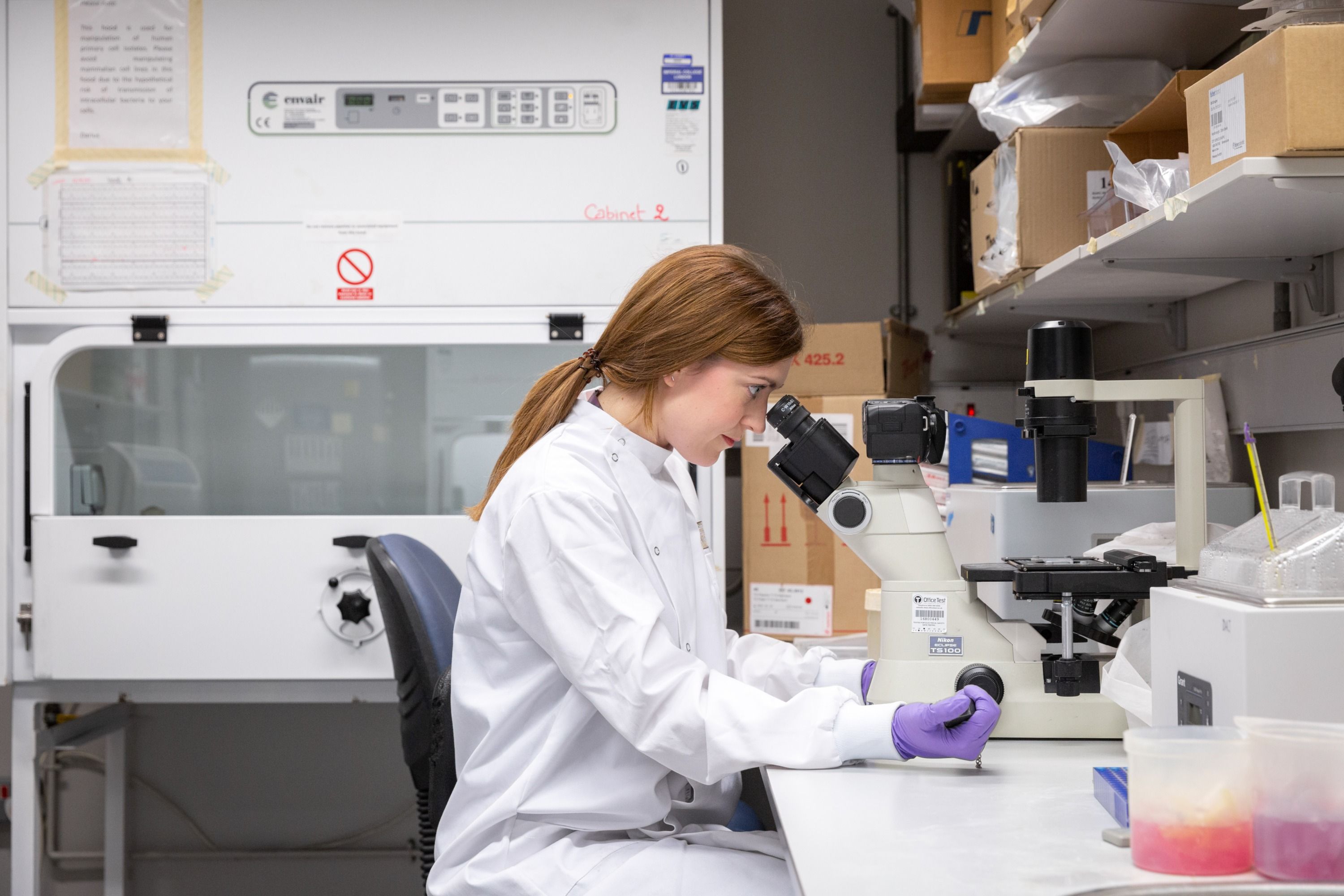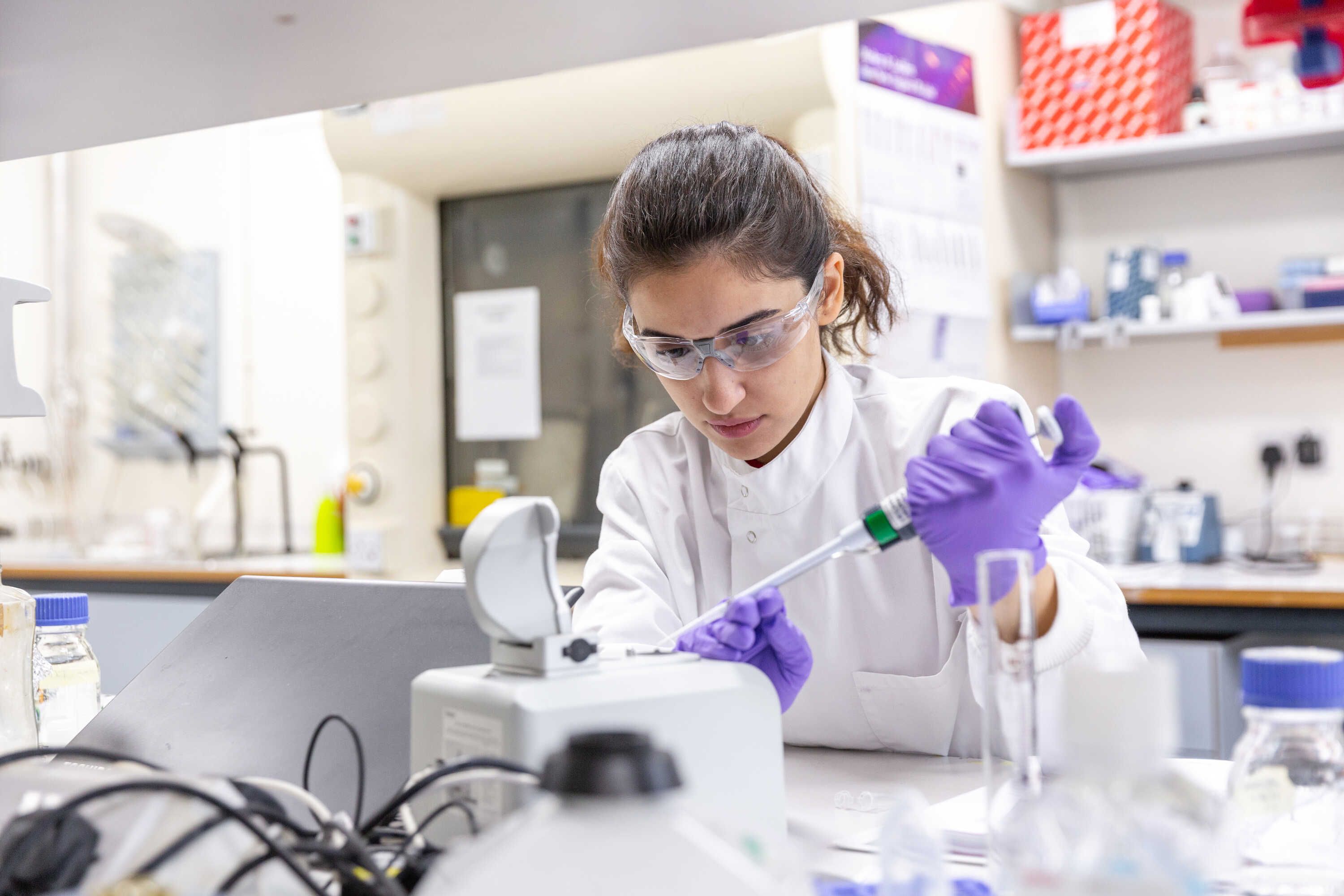
Molecular Medicine
Receive theoretical and practical training using state-of-the-art techniques in molecular and cellular biology as applied to medicine.
Receive theoretical and practical training using state-of-the-art techniques in molecular and cellular biology as applied to medicine
Build your problem-solving skills in data analysis and experimental design
Carry out a laboratory-based research project exploring a set area of molecular medicine
Course key facts
-
Qualification
-
MSc
-
-
Duration
1 year
-
Start date
September 2025
-
Study mode
Full-time
-
Fees
£15,500 Home
£45,000 Overseas
-
Delivered by
-
Location
-
Hammersmith
-
Minimum entry standard
-
2.1 in biological science, medicine, or veterinary science
Course overview
Receive theoretical and practical training towards a career in clinical medicine on this Master's course.
Throughout the programme, you'll become familiar with using a range of state-of-the-art techniques in molecular and cellular biology as applied to medicine.
You'll explore how the practice of clinical medicine is being revolutionised by technological advances.
This includes areas such as gene discovery, cancer, inherited diseases and gene therapy.
You'll also apply your skills and knowledge to a laboratory-based research project, where you'll address one specific area of molecular medicine.
Structure
This page is updated regularly to reflect the latest version of the curriculum. However, this information is subject to change.
Find out more about potential course changes.
Please note: it may not always be possible to take specific combinations of modules due to timetabling conflicts. For confirmation, please check with the relevant department.
You’ll take all of these core modules.
Core modules
Refresh your basic knowledge in molecular and cellular biology, immunology, virology and advance your molecular biology practical skills.
Topics covered include:
- Cell Proliferation
- Cell Surface Receptor Signalling
- Chromatin Structure and Gene Regulation
- Complement System in Health and in Disease
- DNA Replication and Genomic Stability
- Genomic Imprinting
- Inflammasome Biology
- Innate Immunity
- Recombinant DNA Technologies
- Regulation of Coagulation
- Regulation of Endothelial Cell Function
- Vaccines and Immunisation
Understand how the structure and expression of genomes play a role in cellular development and examine the molecular and cellular basis of human diseases.
Topics covered include:
- Allergen-specific Immunotherapy
- Breast Cancer, Prostate Cancer and Lung Cancer Biology
- Coagulation Disorders
- Coeliac Disease
- Genetic Causes of Diabetes
- Genetics of Cleft Lip or Palate
- Genetics of Obesity and Appetite Regulation
- Gene Therapy for Muscular Dystrophy
- Hereditary Haemorrhagic Telangiectasia (HHT)
- Influenza
- Oncogenic Herpes Viruses
- Sepsis
- Tuberculosis
Experience a hands-on approach to experimental work, taking ownership of a project analysing a set frame of scientific themes.
You’ll complete a laboratory-based research project between March and September.
The project can be completed at any Imperial campus, depending on the topic and nature of the project.
You’ll learn from interacting on a daily basis with researchers, presenting in lab meetings, attending seminars, observing others and receiving feedback on your work.
Teaching and assessment
Teaching and learning methods
-
Research projects
-
Tutorials
-
Computer data analysis sessions
-
Group work and revision sessions
-
Virtual learning environment
-
Laboratory teaching
-
Lectures and keynote lectures
Balance of assessment
Key
- Modules
- Laboratory-based research project
- Mini-research project
- 33% Modules
- 50% Laboratory-based research project
- 17% Mini-research project
Assessment methods
-
Data interpretation exercise
-
Research paper critique
-
Oral examination
-
Written examinations
-
Written research thesis report
Entry requirements
We consider all applicants on an individual basis, welcoming students from all over the world.
How to apply
Apply online
You can submit one application form per year of entry. You can choose up to two courses.
There is no application fee for MRes courses, Postgraduate Certificates, Postgraduate Diplomas, or courses such as PhDs and EngDs.
If you are applying for a taught Master’s course, you will need to pay an application fee before submitting your application.
The fee applies per application and not per course.
- £80 for all taught Master's applications, excluding those to the Imperial College Business School.
- £100 for all MSc applications to the Imperial College Business School.
- £150 for all MBA applications to the Imperial College Business School.
If you are facing financial hardship and are unable to pay the application fee, we encourage you to apply for our application fee waiver.
Find out more about how to apply for a Master's course, including references and personal statements.
An ATAS certificate is not required for students applying for this course.
Tuition fees
Home fee
2025 entry
£15,500
You should expect and budget for your fees to increase each year.
Your fee is based on the year you enter the university, not your year of study. This means that if you repeat a year or resume your studies after an interruption, your fees will only increase by the amount linked to inflation.
Find out more about our tuition fees payment terms, including how inflationary increases are applied to your tuition fees in subsequent years of study.
Whether you pay the Home or Overseas fee depends on your fee status. This is assessed based on UK Government legislation and includes things like where you live and your nationality or residency status. Find out how we assess your fee status.
If you're a UK national, or EU national with settled or pre-settled status under the EU Settlement Scheme, you may be able to apply for a Postgraduate Master’s Loan from the UK government, if you meet certain criteria.
For courses starting on or after 1 August 2024, the maximum amount is £12,471.
The loan is not means-tested and you can choose whether to put it towards your tuition fees or living costs.
Overseas fee
2024 entry
£45,000
You should expect and budget for your fees to increase each year.
Your fee is based on the year you enter the university, not your year of study. This means that if you repeat a year or resume your studies after an interruption, your fees will only increase by the amount linked to inflation.
Find out more about our tuition fees payment terms, including how inflationary increases are applied to your tuition fees in subsequent years of study.
Whether you pay the Home or Overseas fee depends on your fee status. This is assessed based on UK Government legislation and includes things like where you live and your nationality or residency status. Find out how we assess your fee status.
If you're a UK national, or EU national with settled or pre-settled status under the EU Settlement Scheme, you may be able to apply for a Postgraduate Master’s Loan from the UK government, if you meet certain criteria.
For courses starting on or after 1 August 2024, the maximum amount is £12,471.
The loan is not means-tested and you can choose whether to put it towards your tuition fees or living costs.
Scholarships
The Dean’s Master’s Scholarships
Value per award
- £10,000
Who it's for
- All students applying to study a Faculty of Medicine Master’s course
The Dr Jean Alero Thomas Scholarships
Value per award
- Partial or full tuition fee at the Home rate
Who it's for
- All students applying to study a Faculty of Medicine lab-based Master’s course
How will studying at Imperial help my career?
Develop the skills necessary to pursue further research (including a PhD).
Common employment paths for graduates from this course include careers in industry, clinical service or scientific medical research.
With a degree in molecular medicine, you’ll also be highly sought after in a variety of alternative fields.
These include education, public administration, research and development, and technical consultancy.
Further links
Contact the department
Senior Lecturer: Dr Paras Anand
Visit the Department of Infectious Disease website.

Request info
Find out more about studying at Imperial. Receive updates about life in our community, including event invites and download our latest Study guide.

Events, tasters and talks
Meet us and find out more about studying at Imperial.

Terms and conditions
There are some important pieces of information you should be aware of when applying to Imperial. These include key information about your tuition fees, funding, visas, accommodation and more.
You can find further information about your course, including degree classifications, regulations, progression and awards in the programme specification for your course.
Programme specifications